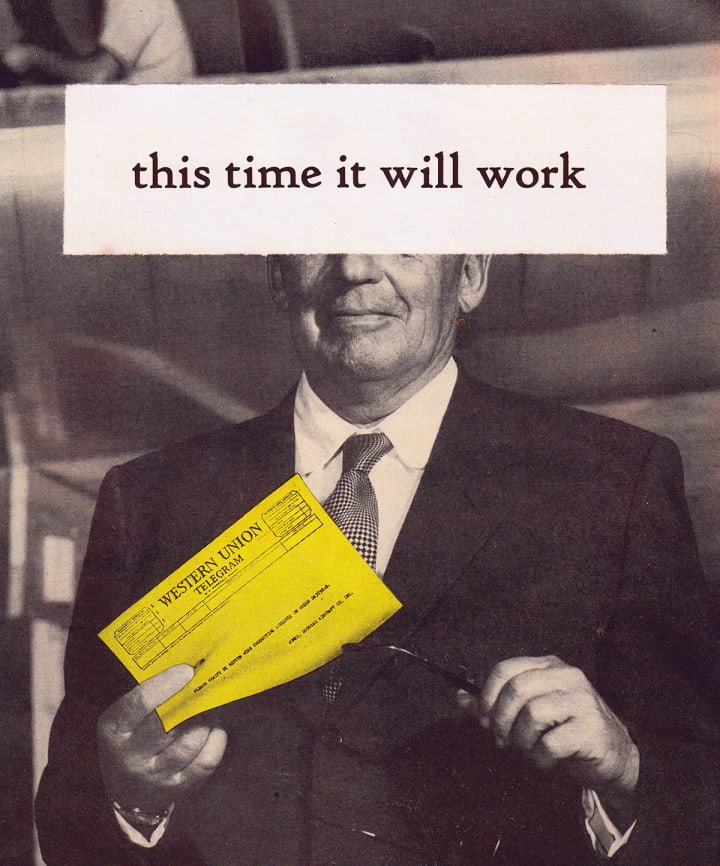How to Revive a Failing Relationship
Psychology and controlled behavior are the keys to reviving a failing relationship.

Must an emotional cure always be a long job? When I'm asked this I generally answer that any basic personality change usually entails working your ass off at helping yourself over a period of time. Psychology and behavioral responses to conditioned activity play an important role in reviving failing relationships. Various experiments with clients are making me qualify this answer. They indicate that there are palliative methods which, if you employ them continually, tend to sink into your cognitive-emotive core and become curative—a permanent part of your behavioral pattern. In my book Rational Sensitivity: Self-fulfillment for Executives, I was able to give three such self-therapy techniques for calming the emotions. Here is how they work.

via Ben Stainton
Rational-Emotive Imagery
Method number one is called rational-emotive imagery. It stems from some of the "positive thinking" techniques of H. Bernheim, Emile Coue, Dorothea Brande, Norman Vincent Peale, and Maxwell Maltz. But it goes far beyond these schemes of positively imagining that you can do something (such as get a full erection or maintain it for a long period of time) instead of negatively imagining (as you may often tend to do) that you can't do this same thing. Positive thinking often works temporarily, but it rarely rids you of the underlying self-damning philosophy: that in case you don't this time achieve the positive goal that you are imagining you will achieve, you are something of a louse and a total incompetent.
Rational-emotive imagery (REI for short) has been developed during the last few years by such clinicians as Drs. Maxie C. Maultsby, Aaron T. Beck, Arnold Lazarus, and myself is solidly rooted in rational-emotive and other cognitive-behavior therapies. For rational-emotive therapy (RET) intensively and profoundly teaches individuals to discover exactly what catastrophizing beliefs they hold—at point B—after something unpleasant or noxious has occurred at point A (the Activating Event of Activating Experience) to cause them to feel upset or disturbed at point C (the emotional Consequence). Then at point D, it shows them how to Dispute their own awfulizing and catastrophizing, and thereby prove to themselves how they can change it for more efficient ways of thinking, emoting, and behaving at point E (rational cognitive and behavioral Effects). An example will make the system clearer. Suppose you experience the emotional Consequence (C) of feeling upset every time you think of making a sexual pass at a woman and trying to get her into bed. You feel, in other words, terribly anxious about making a clear sexual overture (though, up to this point, you may easily be able to meet her, date her, and talk to her endlessly about nonsexual subjects with little or no anxiety). At point A (the Activating Experience), then, you have a reasonably good chance of getting into a sex-love relationship with this woman; but at point C you feel so anxious you usually cop out of making a pass.

via Ben Stainton
Your Belief System
Your problem, according to RET theory, is B—your Belief System. For at B you are in all probability telling yourself: "If I make an overt move toward her and she unmistakably rejects me, that would be frustrating. It would show that, for some reason or other, she is going to block our having sex-love fulfillment." This rational belief (B) is empirically-founded because, obviously, it is frustrating if the woman whom you desire rejects you; and it would only be natural for you to feel (at C) displeased and disappointed about her refusal. Certainly, if you felt happy or indifferent about it, you would be acting rather peculiarly.

via Ben Stainton
Emotional Consequence
But—alas!—you are not merely displeased and sorry, but anxious, hurt, and perhaps depressed. To feel this kind of emotional Consequence (C), you are most probably convincing yourself of a hight irrational or insane Belief (iB): "Isn't it awful that she has rejected me! I can't stand it! It proves that I am a flop as a lover and that no really attractive woman is ever likely to accept me!" This Belief is irrational because:
- It isn't awful but only inconvenient that she rejected you.
- You obviously can stand it though you may never like it.
- It only proves that she doesn't want you as a lover right now and says nothing about the chances of any other woman's ever accepting you.

via Ben Stainton
Disputing Irrational Beliefs
In regular RET, you would Dispute (at point D) these irrational Beliefs (iBs) until you gave them up and ended up with a new Effect (E) along these lines: "It's too bad that some girls, for various reasons, will reject me sexually and amatively, but I can stand it; it proves something about the girl and her tastes rather than something about me." Achieving this new cognitive Effect or philosophy, you would then lose your anxiety and be much less inclined to make yourself upset again when rejected.
In rational-emotive imagery (REI), you go through a similar reasoning process pictorially and imaginatively, without necessarily using any words. Thus, you picture in your head, even before you make a sexual overture toward this woman, the possibility of her rejection. Then you picture yourself feeling sorry and frustrated but not upset. You see yourself, instead, as definitely being able to win acceptance from this woman in the future, or from women who are just as desirable as she.
Mind you, this is different from "positive thinking." For if you used that method, you would picture yourself getting accepted by this woman and being very happy about it. If this imagined script turns out to be false—as well it may, in real life!—you would tend to become disillusioned and depressed. It's more realistic to imagine failure, and then see yourself as beautifully able to take it. For, let's face it, failure—especially in affairs of the heart—is our common lot in life.

via Ben Stainton
Accepting Potential Failures
So try rational-emotive imagery—especially when you know that in a few days you are going to take some important sex-love risk and that you may well fail. See yourself, as vividly as you can, actually failing. But also see yourself calmly, sorrowfully accepting it without upset and refusing to be thrown by it. If you practice this kind of imagery, say, for five minutes a day for several days before you take any important risk, you will probably be surprised how unanxious you will actually be when you literally come to take it. I have used this method recently with scores of clients; and only rarely does it not work out well.

via Ben Stainton
Self-Reinforcement Schedule
A second quick method of applying some of the principles of RET is to set yourself a self-reinforcement schedule when you find it difficult to do some sex-love task and easy to avoid it. This technique was largely invented by psychologists B. F. Skinner, D. Premack, and Lloyd Homme, and has been applied to all kinds of individuals, from kindergarten children to aging adults. The individual with a problem gives himself (sometimes with the help of a therapist) less pleasant or unpleasant tasks that he'd better do and only allows himself to perform other pleasant ones after he has completed them. Suppose you are a wife or mistress and you keep putting off having sex with your partner. You have trouble, let us say, getting yourself under way in this respect, even though once you do start you generally enjoy it. So most nights you say that you are tired, don't feel well, aren't too sexy, or something like that. Before you know that days or even weeks have gone by without you and your mate having any real sex. Naturally, he's displeased and your emotional relationship with him is beginning to suffer.
Using rational-emotive self-reinforcement, you first ask yourself what things you most easily and enjoyably do, and you discover that:
- You easily eat and enjoy food.
- You greatly enjoy talking to your mate about the problems you encounter during the day.
So you set yourself a schedule: you only allow yourself to have a good meal at night and talk to your mate about your problems after you have made some special effort to have sex relations, or have actually had them, the previous day. If you try and your mate refuses, that's OK. If you have sex because he makes an overture and you agree, that's OK. But if today is Tuesday and there's been no attempt on Monday to have or agree to having any kind of sex with him, you force yourself to skip your regular nighttime meal (and don't substitute for it in any way!) and refuse to let yourself talk to your mate about your activities and problems that day.

via Ben Stainton
Acknowledging Failure Without Self Punishment
The special rational-emotive part of this therapy is that while penalizing yourself for your sex-love omissions or goofings, you simultaneously refuse to punish yourself for them. For in RET we make a clear distinction between punishment and penalization. The latter exists when you merely deprive yourself of something pleasant or force yourself to experience something unpleasant. But punishment exists when you put yourself down, and consider yourself worthless because you have merited penalization. If you follow the RET procedure, you will refuse to damn or vilify yourself for any lapse or error whatever. You acknowledge your poor performance; but never, never convince yourself that you are a bad person because of it. You only rate your acts and deeds, never your self, your being.
Another example of self-reinforcing. You realize that you are doing poorly in regard to meeting new girlfriends because you invariably wait for an attractive woman to approach you instead of risking approaching her, and perhaps being refused. So you give yourself this reinforcing assignment: whenever you go to a bar, a dance, a party, or some social affair and see an attractive woman and do not make any effort actively to talk to her, you penalize yourself by, say, not engaging in your regular Friday night poker game, by cleaning your apartment thoroughly instead of letting the maid do it, or by sending a check for $50 to the political party whose policies you most abhor. Again, you penalize yourself while not defaming yourself.

via Ben Stainton
Four-Letter Realism Approach
Probably the most effective of the brief RET techniques you can use to overcome almost any sex or love problem is the four-letter realism approach. I invented this some years ago when I saw that human upset or disturbance is almost always caused by childish grandiosity or demandingness. Instead of your merely wanting or preferring something, you behave like a two-year-old and demand, insist, command, or dictate that you've absolutely got to have it. Then, if you don't have what you've supposedly got to have, you easily (and neurotically) conclude that "It's awful! I can't stand it! What a louse you are for not giving this thing to me, and what a shnook I am for not forcing you to give it!"
In other words, virtually all human emotional disturbance is caused by the devout belief—at point B—in two words: "It's awful!" Thus, you tell yourself:
- "It's awful that I am doing poorly; and I am therefore a pretty worthless person!"
- "It's awful that you are not treating me with utter consideration and justice; and therefore you are a bastard!"
- "It's awful that the world is such a hard place for me to live in; and therefore it is no damned good!"
If you rid yourself entirely of these three awfulnesses, it is difficult to see how you could be seriously upset about anything. "But isn't it awful that certain very obnoxious things occur?" you may ask. "Isn't anything awful?"
Of course not. Awfulness is a bogyman, a nonexistent devil that you make up in your head. It really doesn't exist—no matter how vehemently you think that it does and no matter how strongly you feel that it does. Why doesn’t awfulness exist? For several fairly obvious reasons:
- When you say that it is awful to become, say, totally impotent or infertile, you really mean that it is so disadvantageous that it shouldn’t happen. But why shouldn't it! You don't run the universe; you can't make laws that things that inconvenience you greatly must not exist. No matter how annoying any thing or event is to you, it clearly can, and has a perfect right to, exist; and you are foolishly inventing a nonexistent law that it shouldn't.
- When you say that it is awful if the person you most dearly love rejects you, you mean that you can't tolerate his or her rejection. But, of course, you can, and in 999 chances out of 1000 you will. You only can't stand it because you believe you can't; but that belief is pure fiction, another devil that you invent.
- When you say that it is awful if you continue to fail both sexually and amatively, you really mean that you are a no-goodnik for failing. But how can your entire character and personality be worthless just because of failure in some important aspects of living? Obviously you could (if you chose to) engage in and enjoy other aspects of living. So this again is a demoniacal fabrication.
Just believe in two other words and you can easily eliminate "It's awful!” And those words are? 'Tough shit!"
Or, in a longer version: "Tough shit that I am doing poorly. But that's the way I am: fallible. I'll always do poorly at certain things. Tough!"
And: "Tough shit that you are not treating me with utter consideration and justice. But that's the way you are: often inconsiderate and unjust. I don't like your behavior, and will oppose it But, if necessary, I can gracefully lump it!"
And: "Tough shit that the world is such a hard place for me to live in. But that’s the way it is: hard. And I can live rather happily in spite of its hardness—if I stop whining about how difficult it is!"

via Ben Stainton
Don’t Say “Fuck It”
You could, of course, say to yourself two other four-letter words, namely "Fuck it!" But these words are generally evasive and unrealistic. For if you say "Fuck it! I don't care whether I'm doing poorly!" that's really a lie. You’d better care: for it is disadvantageous for you to do poorly in your sex or love life. And you'd better discover, if you can, why you're doing poorly and what you can do to do better.
Again, if you tell yourself, "Fuck it! Let people act inconsiderately and unfairly to me!" you will often be evading the issue. For you can sometimes prevent them from being so inconsiderate and unkind if you calmly point out to them their poor behavior and try to get them to act better toward you. If a woman, for example, is an inadequate sex partner, you can often patiently teach her how to be a better one. Or if a man won't love or marry you, you can sometimes deliberately act better and more sexually toward him, and finally help him feel that you are lovable and that he wants to marry you. So "Fuck it!" is generally a hostile, evasive belief that will not help you change your reality, but merely bitterly or hopelessly adjust to it.
On the other hand, "Tough shit!" implies that you certainly don't like the way things are, that you are going to do your best to change them; but if somehow they are unchangeable you can still accept grim reality and live not too uncomfortably with it.
I saw a 32-year-old husband and a 28-year-old wife who had been married five years and who were mutually hostile. The husband complained that his wife was sloppy, unsexy, and vituperative; and the wife complained that her husband was only interested in her body, was unloving, and was also vituperative. I had several counseling sessions with the two of them, and in each case first assumed that the complainer was telling the truth.
Thus, I said to the husband: "Let's assume that your wife really is sloppy, unsexy, and vituperative. These traits can be damned annoying. But what are you telling yourself to upset yourself about her having them?" He assumed that all husbands would be equally upset if they had a wife such as he had; and that he therefore should be automatically upset by her crummy behavior. But I insisted that yes, most husbands would be just as disturbed, but that there was no reason why they had to be. They could, theoretically, all accept and tolerate their wives with this poor behavior; and they then could calmly try to help them change it.
After several sessions of counseling, I finally persuaded this husband to change his awfulizing beliefs about his wife's actions. He came in with her for the fifth session, and almost immediately reported: "You know, I'm beginning to see that what you have been showing us can really work. I never thought it would. In fact I thought at first you were crazier than we were! But this week, when I forgot about our wedding anniversary and failed to notice her new dress, and she gave me a 15-minute solid tongue-lashing interspersed with tears, I did exactly what you were trying to get me to do, especially in one of the pamphlets you gave us. I said to myself: Look! She's yelling and crying about me, but she's really got the problem. She's saying something like, 'His treating me like that makes me a real shit!' And, of course, it doesn't. It just makes me a neglectful husband. She's right about that part; I do neglect her. But she's wrong about the nasty tone she's using to me, the unfair way in which she's blaming me for this neglect. It's too goddamned bad; but I can take her being wrong. I'll never like her treating me like this; but I can certainly stand it. Tough shit! And I did stand it; and I was even able to help calm her down a bit. But, mainly, for the first time in these circumstances, I was hardly angry at all."
Meanwhile, this man's wife was doing even better with our counseling procedures. She reported: "I don't know what exactly you told us last time, but it seemed to work like magic. I can hardly believe it. For Gene was as much a pain in the ass to me this week as ever—particularly about sex. As I told you during the first session, he's the most inconsiderate lover you can ever imagine. And, in spite of our talk last week, he did it again! He didn't touch me for several days—which was all right with me, since I was at the beginning of my period. Then, on Wednesday night he mumbled something like "Shit! What’s marriage for, anyway?" and practically raped me. I was quite willing but not the way he wanted it! First no preliminaries whatever not a goddamned minute of them. Second, no attempt to see if I had any kind of orgasm during our two-and-a-half-minutes or so of screwing. Third, when I deliberately called this to his attention—as I usually don't but you told us to be honest about sex, so this time I was being honest—he made no effort whatsoever to satisfy me. Didn't even discuss it. Just rolled over and started to go to sleep.
"Well! I was really boiling and was just about to tell him off when I remembered that you had emphasized that no matter what he did, my upsetness was always caused by me. Well, to my surprise, I quickly saw it. I saw that I was saying, 'There he goes again! Inconsiderate as usual! God, what a thing to do! He's a thorough pain in the ass!—at least, right now.' But then I saw, just as you pointed out, that if I stuck with this thought I would merely get irritated and annoyed, but not truly upset. For the very next thought that came into my head was: 'Yes, that’s right. He is a pain in the ass! But he also does lots of nice things, too. And I really wouldn't want to leave him—else I wouldn't be going to the trouble of seeing Dr. Ellis and doing all kinds of other things to keep the marriage together. So the thought that he's a pain in the ass isn't really the thing that's upsetting me. Now. let me see: what else could it be?'"
"Then it swiftly came to me. I was clearly saying to myself: 'It's awful! He shouldn't be a pain in the ass! What consummate gall for him to behave like this at this time, when I'm for once all sexually excited! How unfair! How awful!' Whereupon, I said to myself: 'OK, I'll try Dr. Ellis's magic formula. What have I got to lose? What was that again? Oh, yes: Tough shit! Tough shit that he's a pain in the ass! But that's the way he is. Tough shit that he has consummate gall! But that's what he has. Tough shit that he's unfair! But that's the way the world often is: unfair. Tough, tough, tough ! Now, why the hell can't I accept this tough reality, live with it and give myself less of a pain in the ass than he's giving me?'"
"Almost immediately, I began to feel the way I was thinking, and I felt immensely better: no longer hostile, though not exactly pleased. And I quickly turned over for the first time in my life under these conditions—and went to sleep. I never thought I could do it; but I did!"
She went on: "Of course, it didn’t last. As Gene has told you, a couple of days later I blew up again. I really got sore when he forgot our anniversary and a couple of other things like that, and I did bawl him out for 15 minutes or so. But what he did not note was that even while I was screaming and yelling, I was also watching myself, seeing how ridiculous I was, and trying to ask myself what I was telling myself to make myself act so ridiculously. It didn't work—or, rather, I didn't work it—right then. But I did a little later. I calmed down; saw what I was saying and doing; and I think it may be awhile again before I steam myself up so violently."
So that was quite a change in both these individuals, particularly the wife, within one week's time. They came around for several joint counseling sessions after that gradually kept improving, and making themselves less and less incensed with the other's behavior. Ultimately, they were both much more tolerant and by that time the wife had also become somewhat less sloppy; and more sexy, and the husband more loving and considerate. Though they didn't have the greatest marriage in the world, they decided that it was unlikely that they would do better in other relationships.
One other brief example of the effective use of the instant therapy techniques outlined above. I saw a male of 38, a highly respectable lawyer-accountant who insisted that he could only be sexually aroused when his partner really wanted and delighted in anal intercourse, performed semi-sadistically. Nothing else, he said, turned him on, no matter how beautiful or loving a woman was. After several sessions of therapy, I induced him to see himself as being quite able to be potent in ordinary copulation or in non-sadistic anal relations.
Secondly, I encouraged him to put himself on a self-reinforcing schedule so that he only allowed himself his favorite relations after at least three encounters with other kinds of intercourse. Thirdly, he began to think, whenever he failed to have great enjoyment non-anally, "Tough shit! So it wasn't as ideal for me as it might be. Does it have to be exactly the way I want it? Can't I, for the sake of the woman I'm with and for other reasons, let myself really enjoy ordinary intercourse, and stop bitching? I'm going to let myself have a ball with any kind of sex if it's the last thing I do!"
Through these three methods, this highly fetishistic and previously one-faceted male was soon able to enjoy different forms of sex and sometimes to experience exceptional pleasure in performing them.
These instant methods of rational-emotive therapy do not of course, always work quick wonders. Often, longer-termed RET techniques are required; and sometimes a variety of therapeutic modes have to be employed until an individual starts to solve a sex-love problem. But they do work beautifully with a large number of people. If anything really bothers you, sexually or nonsexually, try them for yourself and see!
About the Creator
Filthy Staff
A group of inappropriate, unconventional & disruptive professionals. Some are women, some are men, some are straight, some are gay. All are Filthy.






Comments
There are no comments for this story
Be the first to respond and start the conversation.